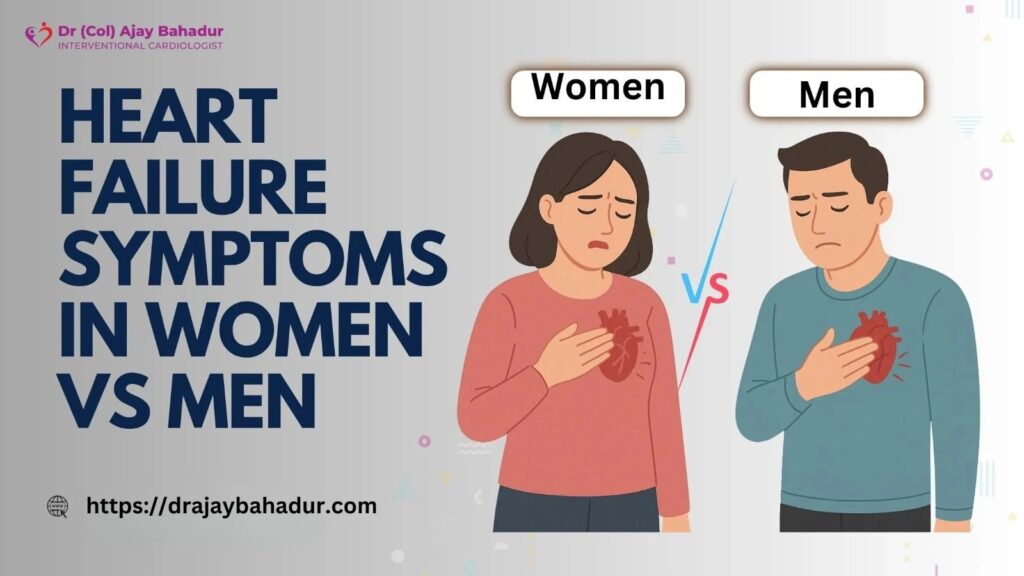Heart Failure Symptoms in Women vs Men
Heart failure is a serious condition where the heart is unable to pump blood effectively, leading to fatigue, breathlessness, and other health complications. While both men and women can develop heart failure, the symptoms, risks, and outcomes often differ by gender.
Recognizing these differences is critical—because early detection can save lives. Unfortunately, heart disease in women is often underdiagnosed, as symptoms may appear more subtle compared to men. If you notice any of these signs, consult a best cardiologist in Lucknow for timely treatment.
In this guide, we’ll explore the key differences in heart failure symptoms between women and men, why they happen, and how to protect yourself naturally.
1. Heart Failure in Women: Common Symptoms
Women often develop a type called Heart Failure with Preserved Ejection Fraction (HFpEF), where the heart pumps normally but is stiff and doesn’t fill with blood properly.
Typical Symptoms in Women:
-
Shortness of breath (especially during activity or lying flat)
-
Swelling in legs, ankles, or abdomen
-
Severe fatigue and reduced exercise tolerance
-
Difficulty sleeping due to breathing problems
-
Palpitations or irregular heartbeat
Women are also more likely to report nausea, loss of appetite, and depression, which can sometimes delay diagnosis.
2. Heart Failure in Men: Common Symptoms
Men more often develop Heart Failure with Reduced Ejection Fraction (HFrEF), where the heart muscle becomes weak and cannot pump efficiently.
Typical Symptoms in Men:
-
Persistent cough or wheezing
-
Fluid buildup in the lungs (causing chest tightness)
-
Rapid weight gain due to fluid retention
-
Dizziness or fainting spells
-
Swelling in the abdomen and lower body
Men may experience more dramatic fluid buildup than women, making their symptoms appear more sudden and severe.
3. Why Are Symptoms Different?
The differences come down to biology and hormones:
-
Women’s hearts are generally smaller, with thicker walls, leading to stiffness and HFpEF.
-
Estrogen provides some protection in younger women, but risk rises after menopause.
-
Men’s hearts are more prone to muscle weakening and dilation, causing HFrEF.
4. Risk Factors in Women vs Men
Women: Hypertension, obesity, thyroid disease, autoimmune conditions, and menopause-related changes.
Men: Coronary artery disease, smoking, alcohol overuse, and prior heart attacks.
If you have these risk factors, consulting the Best heart specialist in Lucknow can help with early diagnosis and prevention strategies.
5. Natural Prevention Tips for Both Men & Women
While some risks cannot be changed, lifestyle habits can significantly reduce the chance of developing heart failure.
Healthy Heart Habits:
-
Balanced Diet: Eat fresh fruits, leafy greens, nuts, whole grains, and omega-3-rich foods like salmon.
-
Stay Active: At least 30 minutes of walking, yoga, or swimming daily supports heart strength.
-
Limit Salt & Processed Foods: Too much sodium causes fluid retention and worsens heart failure.
-
Quit Smoking & Reduce Alcohol: Both weaken the heart muscle and raise blood pressure.
-
Manage Stress: Deep breathing, meditation, or mindfulness helps protect heart health.
-
Regular Checkups: Early diagnosis through routine blood pressure and cholesterol monitoring is essential.
6. Recovery & Management if Diagnosed
If you already have heart failure, proper management can help you live a longer, healthier life.
Recovery Steps:
-
Take medications as prescribed by your doctor (never skip doses).
-
Track weight daily—sudden gains may mean fluid buildup.
-
Wear compression stockings to reduce swelling if recommended.
-
Sleep with your head elevated to ease breathing at night.
-
Stay connected with your cardiologist for regular monitoring.

Key Takeaways – Men vs Women Heart Failure
| Aspect | Women | Men |
|---|---|---|
| Common Type | HFpEF (stiff heart) | HFrEF (weak heart) |
| Symptoms | Fatigue, breathlessness, palpitations, nausea | Cough, chest tightness, fluid retention, dizziness |
| Risk Factors | Hypertension, obesity, menopause | Heart attack history, smoking, alcohol |
| Prevention | Exercise, diet, stress control, hormone balance | Exercise, diet, avoid smoking/alcohol |
| Management | Regular checkups, lifestyle + medication | Early diagnosis, fluid monitoring, medication |
Final Thoughts
Heart failure is a life-altering condition, but understanding how it affects women and men differently is key to prevention and early diagnosis. Women often present with subtle symptoms like fatigue and nausea, while men may experience more classic signs like chest tightness and fluid buildup.
By staying active, eating heart-friendly foods, avoiding harmful habits, and seeking regular medical checkups, you can protect your heart health naturally. If you live in Uttar Pradesh and face any warning signs, don’t delay—consult the best cardiologist in Lucknow or the Best heart specialist in Lucknow for expert care.
Remember: Whether you’re male or female, listen to your body. If you notice persistent shortness of breath, swelling, or fatigue, consult a cardiologist immediately. Early action saves lives.


